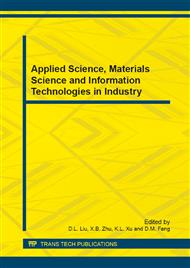p.4223
p.4227
p.4231
p.4235
p.4239
p.4244
p.4248
p.4253
p.4257
University Campus Safety Based on the AHP-Fuzzy Evaluation
Abstract:
Aiming at the increasingly severe problem of University Campus Safety, this paper uses AHP based on the analysis and study of daily management of universities to establish five indexes as first criteria layer, which are school safety management, the management of counselor, the family factor, the factor of college student, social safety environment, and nineteen safety evaluation indexes as second criteria layer. So the Stratified hierarchical structure model can be built. As a result the fuzzy comprehensive evaluation model can be established. More over this paper applies MATLAB to solve the calculation of the model. Through the empirical analysis the evaluation result is consistent with the actual situation. Finally the result shows that the model have an important guiding significance to safety management work in colleges and universities, besides it is feasibility and operability.
Info:
Periodical:
Pages:
4239-4243
Citation:
Online since:
February 2014
Authors:
Price:
Сopyright:
© 2014 Trans Tech Publications Ltd. All Rights Reserved
Share:
Citation:


